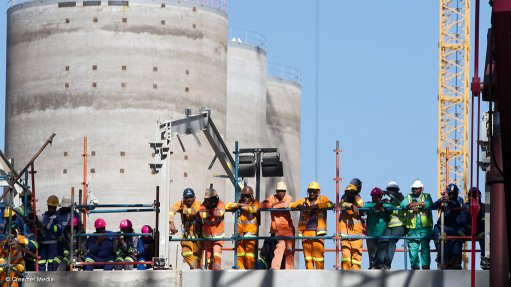
Photo by: Duane Daws
The Bargaining Council for the Civil Engineering Industry (BCCEI) has been accredited by the Commission for Conciliation, Mediation and Arbitration (CCMA) to handle all civil engineering sector disputes.
This would mean that companies that were not members of the South African Forum of Civil Engineering Contractors or employees who were not members of the Building, Construction and Allied Workers Union or the National Union of Mineworkers, but fell within the civil engineering industry, would now derive the same advantages as those companies and employees who were members of these entities.
Effective September 1, the accreditation also meant that companies and employees no longer had to go directly to the CCMA.
“Apart from the time saving benefits this offers stakeholders, they are now able to access a panel of skilled professional commissioners with industry specific experience at the BCCEI. Being able to leverage the expertise and knowledge of the panel members will provide stakeholders with a strong and reliable arsenal,” BCCEI senior case management officer Merle Denson said.
As an independent statutory body, the BCCEI provided an unbiased and impartial service to the civil engineering sector and could assist parties with direction and support in line with industry specific standards and guidelines.
Denson added that, although the majority of the cases in the Johannesburg, Pretoria and Vanderbijlpark area would be heard at BCCEI’s facility in Bedfordview, a skilled CCMA-accredited commissioner would be appointed to facilitate the process in other regions.
These exceptions included large long-term multidisciplinary projects, where specific site agreements applied, including State-owned power provider Eskom’s Medupi and Kusile projects, and where party and nonparty disputes arose.
In this instance, disputes would be heard on site. Denson cautioned that, irrespective of the hearing venue, parties needed to be aware that once arbitration awards were made they were final and binding.
“Adding to the time savings applied with the BCCEI’s accreditation, we are able to provide further time saving benefits by allowing employers, at a minimal cost, to refer an inquiry by arbitrator (S188A), previously known as a predismissal arbitration, to the BCCEI. This process is intended to take the place of a disciplinary enquiry and takes the hearing straight to arbitration, which is both cost effective and time saving for the parties and it means that the matter cannot be referred to the council for conciliation,” Denson added.
Other benefits to an inquiry by arbitrator process included the fact that a hearing could be heard at the employer’s premises, at a date and time chosen by the parties and the commissioner can also be chosen by party consent, making the outcome final and binding and if any party was dissatisfied with the outcome, the award could be taken on review to the Labour Court.